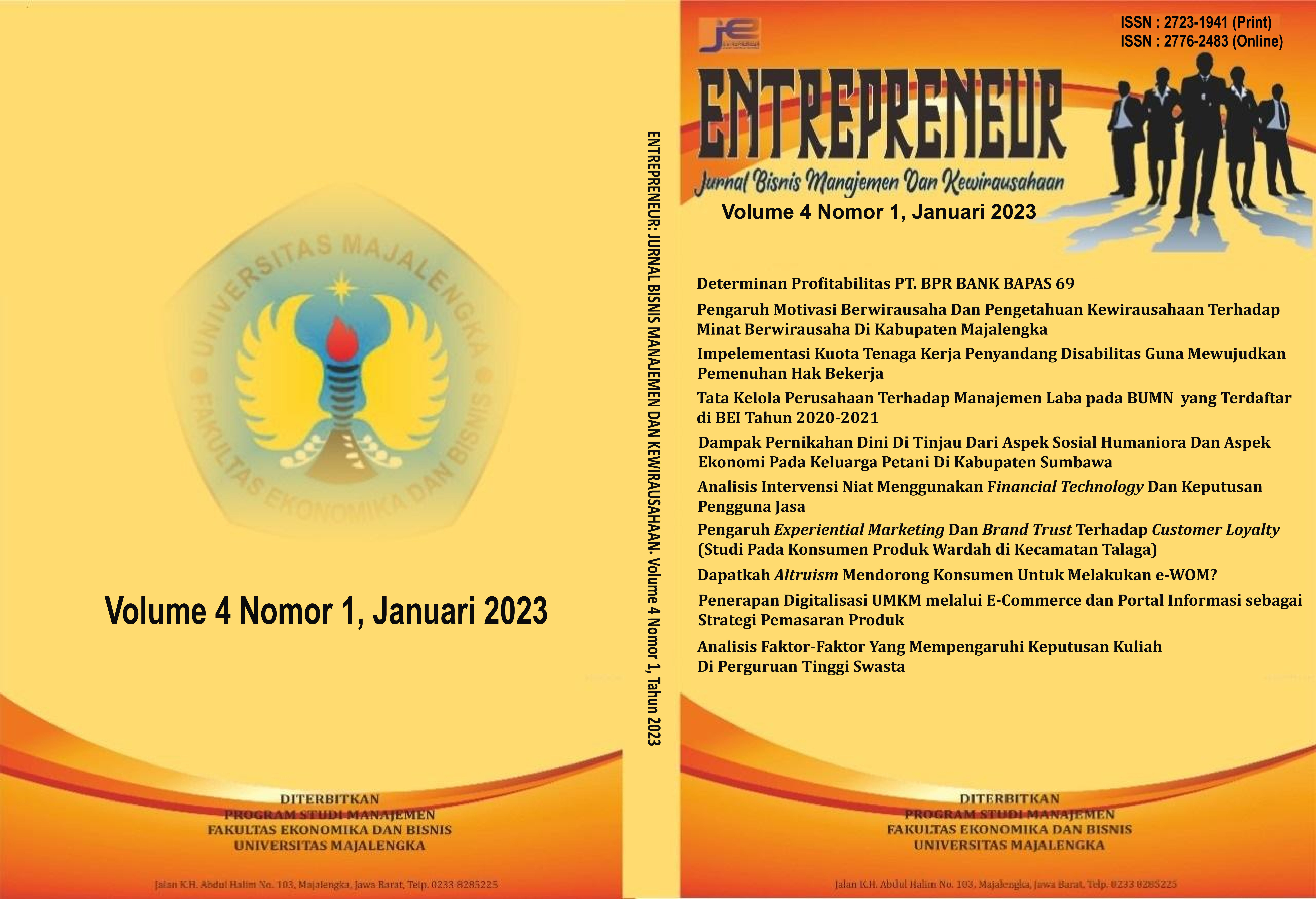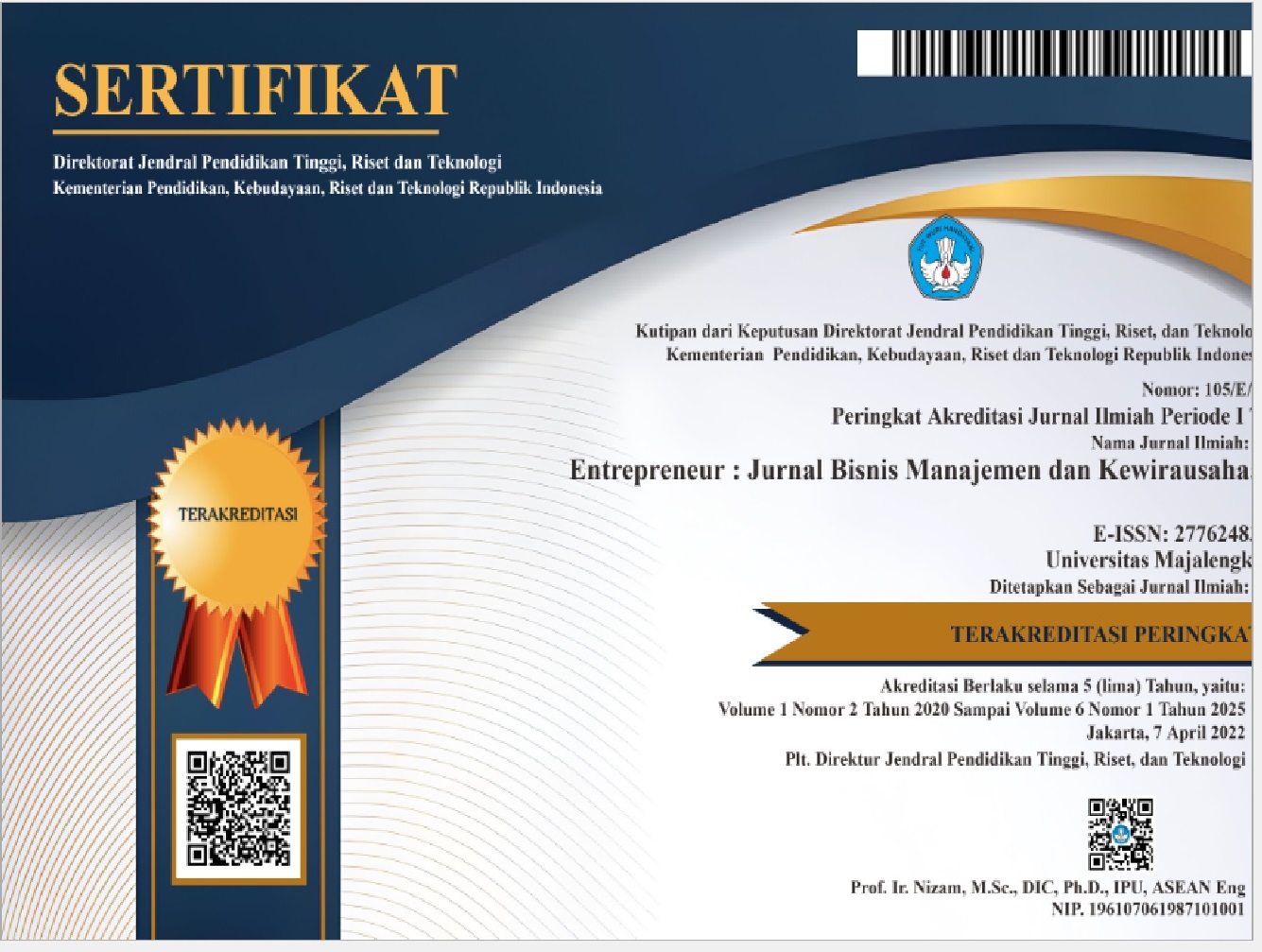IMPLEMENTASI KUOTA TENAGA KERJA PENYANDANG DISABILITAS GUNA MEWUJUDKAN PEMENUHAN HAK BEKERJA
(Study Perusahaan-Perusahaan di Kota Tangerang)
DOI:
https://doi.org/10.31949/entrepreneur.v4i1.3256Abstrak
This study aims to explore the quota of disabled workers in companies in Tangerang City. To obtain research data information, purposive sampling method is used to determine which companies can be the object of research. The selected company is a private company in Tangerang City. Interview method with the determination of informants through the snowball technique. The findings of this study are that the implementation of the quota for persons with disabilities in Tangerang City still does not fully meet the quota according to the mandate of Law Number 8 of 2016 concerning Persons with Disabilities, this can be seen from the monitoring results of the Tangerang City Manpower Office in 2022 that only 144 people with disabilities work and are spread across 7 companies in Indonesia. Tangerang City. This is partly due to the lack of job training for persons with disabilities held by the Tangerang City Manpower Office and the lack of companies and organizations for persons with disabilities that are partnered with the Tangerang City Manpower Office to be invited to cooperate in distributing workers with disabilities to companies in Tangerang City. Some of the obstacles that exist in fulfilling quotas for people with disabilities in the world of work include the number of companies that do not open job vacancies, both companies that do not know the quota for workers with disabilities mandated by Law Number 8 of 2016 and those who already know, companies still have doubts if people with disabilities have disabilities. people with disabilities can work, companies only accept certain types of disabilities, companies require a minimum of a Diploma three graduate as well as disability adjustment in the world of work which is still difficult so that companies consider whether or not a disability is accepted for work as well as providing accessibility for high-cost people with disabilities who can't afford it. provided by the company so that they choose not to employ persons with disabilities.
Kata Kunci:
kuota, tenaga kerja, perusahaan, disabilitasUnduhan
Referensi
Utami Dewi. Implementasi kebijakan kuota bagi penyandang disabilitas untuk mendapatkan pekerjaan di kota Yogyakarta. Jurnal Natapraja Vol. 3 No. 2. 2015.
Ismail Shaleh. Implementasi Pemenuhan Hak Bagi Penyandang Disabilitas Ketenagakerjaan Di Semarang. Kanun Jurnal Ilmu Hukum Ismail Shaleh Vol. 20, No. 1, (April, 2018). DOI: https://doi.org/10.24815/kanun.v20i1.9829.
Dyah Ayu Purwati. Kewajiban Pemenuhan Kuota Pekerja Penyandang Disabilitas Di Perusahaan BUMN. Jurist-Diction. 2020; 921-934. DOI: 10.20473/jd.v3i3.18630
Somantri, S. (2012). Psikologi anak luar biasa, (Bandung: PT. Refika Aditama, 2007), hlm. 65
BPS, 2019 dalam https://difabel.tempo.co
www.gerakinklusi.id, diakses 29 Juni 2020
Reza Triyuli Yatim, Strategi Komunikasi Pemasraan Melalui Permberdayaan Penyandang Disabilitas Cafe Mella House Of Donuts, Skripsi : Fakultas Dakwah dan Komunikasi Universitas Islam Negeri Alauddin Makassar tahun 2018.
Chadijah, Sit, Pemenuhan hak penyandang disabilitas berdasarkan undang-undang nomor 8 tahun 2016 di desa jagabaya. Abdi laksana jurnal pngabdian masyarakat vol. 2 no. 3 tahun 2021 hlm. 411
Maria Nurma Septi Arum Kusumastuti. 2016. Perlindungan Hukum Dari Diskriminasi Bagi Penyandang Disabilitas Dalam Dunia Kerja. KSRIPSI. Fakultas Hukum Universitas Admajaya
Purinami, Penyandang Disabilitas Dalam Dunia Kerja. Jurnal pekerja sosial vol. 1 No. 3 tahun 2018
Wawancara terhadap pegawai Disnaker Kota TangerangPada 11 April 2022 pukul 10.21 WIB
Rizano, Implementasi pemenuhan hak penyandang cacat dalam memperoleh pekerjaan pada perusahaan negara dan swasta di kota pekanbaru berdasarkan undang-undang nomor 4 tahun 1997 tentang penyandang cacat. JOM Fakultas Hukum vol. 1 No. 2 tahun 2014 hlm. 2
Anaessaburi, Ahmad, Pelaksanaan pemberian kesempatan kerja bagi penyandang disabilitas netra di Daerah Istimewa Yogyakarta. SKRIPSI. Fakultas Syari`ah dan hukum. Universitas islam negeri sunan kalijaga tahun 2017 hlm. 5
Hidayatullah, Fajri, Implementasu kebijakan rekrutmen tenaga kerja disabilitas tunanetra di BUMD DKI Jakarta. Delegalata jurnal ilmu hukum Vol. 8 no. 2 tahun 2021 hlm. 414
Hasyim, Dardiri, Identifikasi Pemenuhan Hak Bagi Difable (Penyandang Cacat) dalam KUHPerdata (Studi Analisis Pemenuhan Hak Bagi Difable dalam KUHPerdata Perspektif Convention on the Rights of Persons with Disabilities dalam UU Nomor 19 Tahun 2011). Jurnal Serambi Hukum vol. 10 no. 2 tahun 2017 hal. 15
Wawancara pada salah satu perusahaan garmen di Kota Tangerang Pada 21 April 2022 pukul 13.24 WIB
Larasati, Natasya, Implementasi kebijakan kesamaan kesempatan kerja bagi penyandang disabilitas di DKI Jakarta. SKRIPSI. Fakultas Ilmu Administrasi. Universitas Brawijaya tahun 2018
Trimaya, Arrista, Upaya Mewujudkan Penghormatan, Perlindungan Dan Pemenuhan Hak Penyandang Disabilitas Melalui Undang-Undang Nomor 8 Tahun 2016 Tentang Penyandang Disabilitas. Jurnal Legislasi Indonesia Vol. 13 No. 4 tahun 2016 hlm. 402

Diterbitkan
Cara Mengutip
Terbitan
Bagian
Lisensi
Hak Cipta (c) 2023 Riandi Pratama MZ, Susanto

Artikel ini berlisensiCreative Commons Attribution-ShareAlike 4.0 International License.
COPYRIGHT NOTICE
An author who publishes in the Entrepreneur: Jurnal Bisnis Manajemen dan Kewirausahaan agrees to the following terms:
1. Author retains the copyright and grants the journal the right of first publication of the work simultaneously licensed under the Creative Commons Attribution-ShareAlike 4.0 License that allows others to share the work with an acknowledgment of the work's authorship and initial publication in this journal
2. The author is able to enter into separate, additional contractual arrangements for the non-exclusive distribution of the journal's published version of the work (e.g., post it to an institutional repository or publish it in a book) with the acknowledgment of its initial publication in this journal.
3. The author is permitted and encouraged to post his/her work online (e.g., in institutional repositories or on their website) prior to and during the submission process, as it can lead to productive exchanges, as well as earlier and greater citation of the published work







